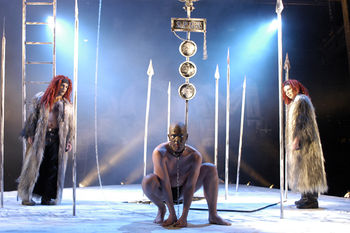Titus Andronicus: Difference between revisions
imported>Derek Hodges No edit summary |
imported>Derek Hodges (to be continued and copy edited.) |
||
| Line 1: | Line 1: | ||
{{subpages}}{{Image|Titus Andronicus 2.jpg|right|350px|Scene from Titus Andronicus by William Shakespeare. Landesbühne Niedersachsen Nord , 2004/2005 season, directed by Reinhardt Friese}} | {{subpages}}{{Image|Titus Andronicus 2.jpg|right|350px|Scene from Titus Andronicus by William Shakespeare. Landesbühne Niedersachsen Nord , 2004/2005 season, directed by Reinhardt Friese}} | ||
'''Titus Andronicus''' is one of William Shakespeare's earliest plays, written, along with [[The Comedy of Errors]], in 1590. In form it is Shakespeare's take on the [[revenge tragedy]], hugely popular with Elizabethan audiences. Later audiences aspired to a more refined taste. It has seen a number of recent film and stage revivals, the central theme of revenge resonating with contemporary directors. | '''Titus Andronicus''' is one of William Shakespeare's earliest plays, written, along with [[The Comedy of Errors]], in 1590. In form it is Shakespeare's take on the [[revenge tragedy]], hugely popular with Elizabethan audiences. Later audiences aspired to a more refined taste. It has seen a number of recent film and stage revivals, the central theme of revenge resonating with contemporary directors. | ||
==Synopsis== | |||
As the play opens Saturninus and Bassianus, the sons of the late Roman emperor are addressing the Roman people, each seeking to become emperor. Their orations are cut short by the triumphant return of Titus Andronicus, who has defeated the rebellious Gauls. Titus brings with him his surviving sons and his captives; Tamora, Queen of the Goths, her Moorish lover, Aaron and her sons. | |||
Two of Titus' son's have died in battle. Titus sacrifices Tamora's eldest son to propitiate their spirits. | |||
Titus' brother Marcus,one of the Tribunes of Rome, nominates Titus as Emperor. Titus declines, instead settling the dispute between Saturninus and Bassianus in favor of Saturnius. | |||
The new emperor offers to marry Lavinia, the daughter of Titus. She is betrothed to Bassianus. Titus is outraged when Lavinia and Bassianus make their escape aided by some of the younger members of the Andronicii. | |||
Saturninus, meanwhile, has become infatuated with Tamora. He will marry her instead. Lavinia and Bassianus return and are reconciled to the emperor. | |||
Aaron now reveals himself to be a villain, in many respects the prototype for Iago in Shakespeare's later play. Lavinia and Bassianus, along with the other members of Titus' family accompany Emperor and Tamora on a hunt. He goads Tamara's surviving sons into brutally raping and mutilating Lavinia and killing Bassianus | |||
Revision as of 19:36, 3 September 2011
Titus Andronicus is one of William Shakespeare's earliest plays, written, along with The Comedy of Errors, in 1590. In form it is Shakespeare's take on the revenge tragedy, hugely popular with Elizabethan audiences. Later audiences aspired to a more refined taste. It has seen a number of recent film and stage revivals, the central theme of revenge resonating with contemporary directors.
Synopsis
As the play opens Saturninus and Bassianus, the sons of the late Roman emperor are addressing the Roman people, each seeking to become emperor. Their orations are cut short by the triumphant return of Titus Andronicus, who has defeated the rebellious Gauls. Titus brings with him his surviving sons and his captives; Tamora, Queen of the Goths, her Moorish lover, Aaron and her sons.
Two of Titus' son's have died in battle. Titus sacrifices Tamora's eldest son to propitiate their spirits.
Titus' brother Marcus,one of the Tribunes of Rome, nominates Titus as Emperor. Titus declines, instead settling the dispute between Saturninus and Bassianus in favor of Saturnius.
The new emperor offers to marry Lavinia, the daughter of Titus. She is betrothed to Bassianus. Titus is outraged when Lavinia and Bassianus make their escape aided by some of the younger members of the Andronicii.
Saturninus, meanwhile, has become infatuated with Tamora. He will marry her instead. Lavinia and Bassianus return and are reconciled to the emperor.
Aaron now reveals himself to be a villain, in many respects the prototype for Iago in Shakespeare's later play. Lavinia and Bassianus, along with the other members of Titus' family accompany Emperor and Tamora on a hunt. He goads Tamara's surviving sons into brutally raping and mutilating Lavinia and killing Bassianus
